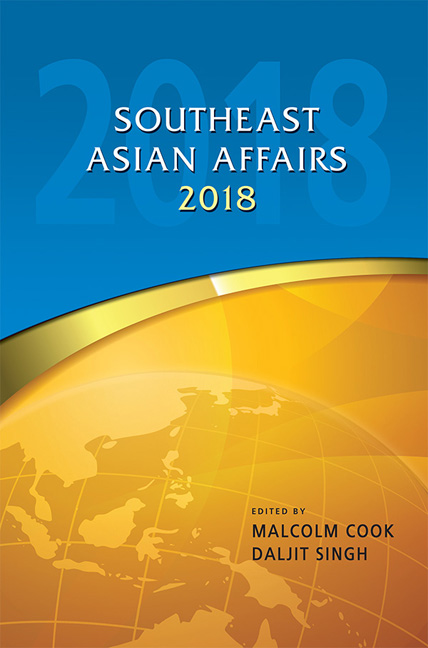Book contents
- Frontmatter
- Contents
- Introduction
- Acknowledgements
- THE REGION
- BRUNEI DARUSSALAM
- CAMBODIA
- INDONESIA
- LAOS
- MALAYSIA
- MYANMAR
- THE PHILIPPINES
- The Philippines in 2017: Turbulent Consolidation
- Narratives and Counter-Narratives: Responding to Political Violence in the Philippines
- SINGAPORE
- THAILAND
- TIMOR-LESTE
- VIETNAM
The Philippines in 2017: Turbulent Consolidation
from THE PHILIPPINES
Published online by Cambridge University Press: 08 June 2019
- Frontmatter
- Contents
- Introduction
- Acknowledgements
- THE REGION
- BRUNEI DARUSSALAM
- CAMBODIA
- INDONESIA
- LAOS
- MALAYSIA
- MYANMAR
- THE PHILIPPINES
- The Philippines in 2017: Turbulent Consolidation
- Narratives and Counter-Narratives: Responding to Political Violence in the Philippines
- SINGAPORE
- THAILAND
- TIMOR-LESTE
- VIETNAM
Summary
At the end of 2017, President Rodrigo Duterte and his administration finished in a stronger position than at the beginning of the year, as did the Philippine economy. This was the case despite 2017 being a turbulent year, even by Philippine standards.
Marawi City, the largest city in Muslim Mindanao, was taken over for months by a coalition of ISIS-inspired local and regional terrorists. A fifth of the country ended the year under martial law, while the rest of the country remained under an indefinite state of emergency declared in September 2016. The Philippine National Police were twice removed from the crusade-like war on drugs, due to gruesome deaths of apparently innocent foreigners and children, and then reinstated. The Philippine government suspended peace talks with the communist insurgents, started them again, then suspended them again and reclassified the Communist Party of the Philippines and its armed wing, the New People's Army, as terrorist groups. Congress’ Commission on Appointments knocked back the largest number of cabinet appointments made by any president (five). According to President Duterte, China threatened war if the Philippines exercised its maritime rights in the West Philippine Sea.
In Southeast Asian Affairs 2017, Aries A. Arugay from the University of the Philippines analysed the socio-political reasons for President Duterte's surprise “outsider” victory in the May 2016 presidential elections. His victory was truly a populist watershed moment in the country's post-Marcos democratic development. Joseph Franco from the S. Rajaratnam School of International Studies in Singapore and a former Philippine soldier deployed to Mindanao dissected President Duterte's new and often contradictory approach to the insurgency in Muslim Mindanao and the terrorist groups it continues to spawn.
Building on these two chapters, this year's Philippine country overview contends that 2017 was a year of political consolidation for President Duterte and his administration. The year saw much of the potential for change and a new style of government promised by President Duterte's May 2016 victory, for good and bad, be turned into political reality. The chapter begins by looking at developments in national politics and how the president's political position strengthened and his prerogative was wielded over the year.
- Type
- Chapter
- Information
- Southeast Asian Affairs 2018 , pp. 267 - 284Publisher: ISEAS–Yusof Ishak InstitutePrint publication year: 2018



